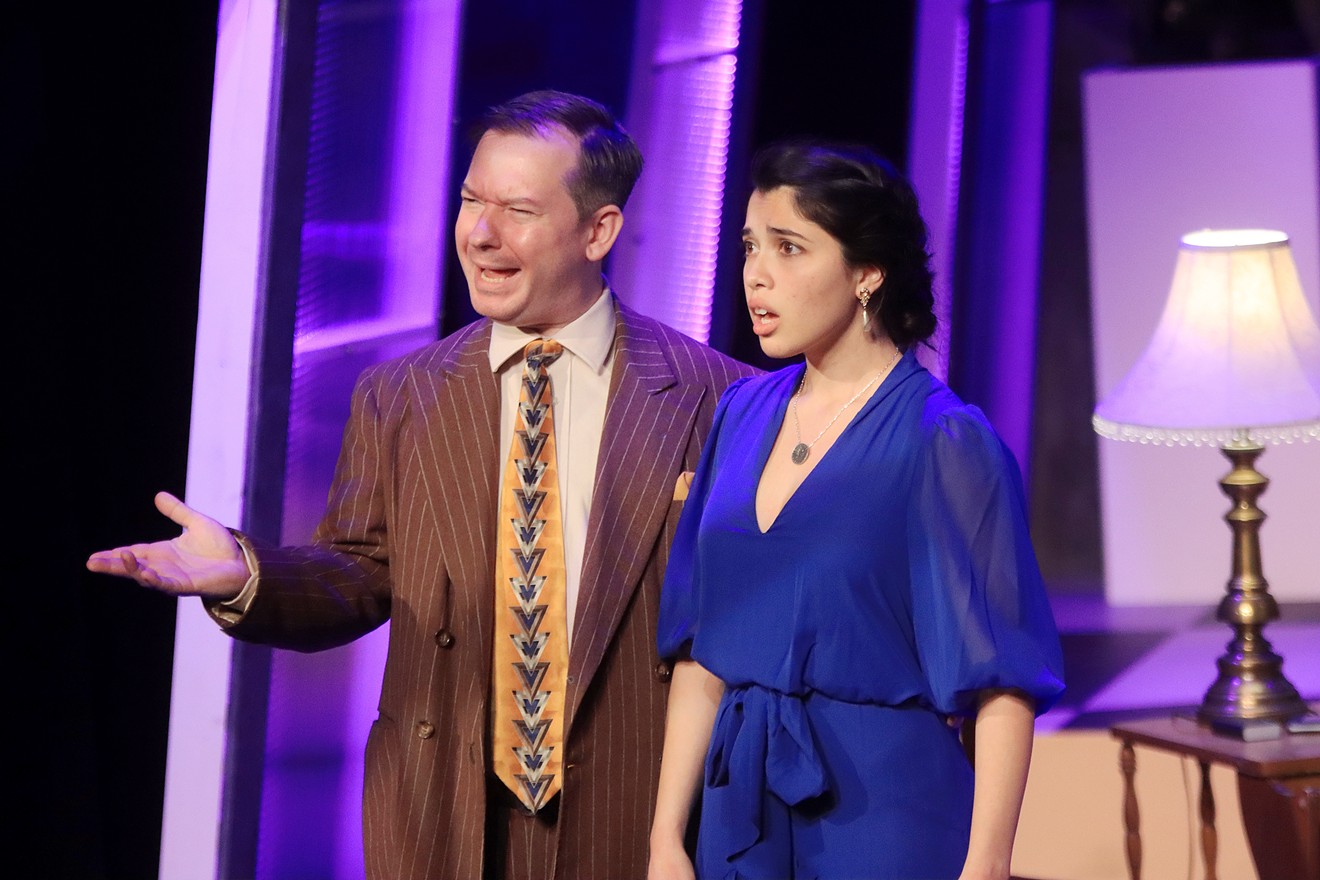To say that Classical Theatre is presenting Karel Čapek’s 1921 sci-fi play, R.U.R, a work that first introduced the word “robot” to the English language, is factual but not entirely instructive. To truly capture the essence of this production, it's far more wholistic to say that Jon Harvey is directing a production of Karel Čapek’s sci-fi play for Classical Theatre, and oh boy, has he made some directorial decisions.
Čapek’s work here is the genesis of what’s become the well-worn robot revolt trope. Man makes artificial people with great intelligence but no souls to be used as slave labor. To turn humans into aristocrats of the world serviced by machines.
But you can’t keep a smart, soulless robot down forever. Especially not when man has started using robots to fight their wars, thereby teaching them to kill and be killed. Soon they want more than the nothing-burger man has allotted them. It’s not equality they desire, it’s domination. And that mastery, of course, comes at man’s expense.
Lessons are meant to be learned in all this. The perils of playing God. Greed leading to no good. The hubris of outsmarting nature with innovation. Pitfalls not only of the past, but screamingly of the present.
Not exactly a light-hearted tale……unless you're director Harvey, who runs three acts of the play as a screwball comedy with physical gags, a man in a dress, and assorted goofiness all around.
We see most of the play through the eyes of Helena (self-assured Elissa Cuellar) the daughter of the president of an industrial power. She visits R.U.R, the robot factory (a handsome shades of grey deco-futuristic inspired set by Afsaneh Aayani) under the guise of wanting to purchase the robots.
In truth, she wishes to liberate them or at least demand they be treated more humanely. Harry (a nimble Calvin Hudson), the factory director, proudly shows her around and introduces her to the other human managers (Dillon Dewitt, Lindsay Ehrhardt, Rhett Martinez, Briana Resa and Gabriel Regojo).
That they all immediately fall in love with Helena is on Čapek. Henry even talks her into marriage in mere minutes. However, the near slapstick performance of the managers rests on Harvey’s shoulders.
They over-emote. They scurry around as a pack. They giggle and furrow and declare bombastically right up until their final moments.
It’s a bold move by Harvey, even with the iffy outcome. On the one hand, it’s tremendously discordant watching a story about man’s greed and resulting destruction with half the cast playing it for obvious yuks.
But then what if they played it straight? Well, there’d be issues with that as well.
Čapek’s play is full of declarative monologue-type dialogue that feels dated in its construction. Characters don’t talk to each other as much as throw out philosophical ideas for or against robot manufacturing. We get some great fat to chew on for sure, but at a sloggy 2.5 hours, that fat, with no levity to help break it up, turns to gristle lickety-split.
Perhaps there’s no satisfying way to stage this play in 2021 despite the show's trenchant observations on human behavior and the systems we operate under. Maybe that’s the gift Čapek gave us, not his play per se, but the ideas held within it.
Not to say this production isn’t without its own unique gifts. Two in particular. Interestingly, neither one with a whiff of comedy about it but both benefitting from the director’s touch.
For a play about robots, we oddly get very little time with them onstage. But when we do, specifically when it’s Blake Weir playing a trio of machines, the show sparks.
It must be strange for an actor to deliver lines with no emotion whatsoever. To do the opposite of what they’re trained to do. Weir’s absence of emotion however comes with a haunting emptiness that reverberates in a fascinating type of eeriness.
However, it's his machine movements that seal the deal. Thankfully no disco robot dance moves here, just subtle motion that has Weir turn his head in the direction he's moving before the rest of his body or a fist that slowly clenches and unclenches when he starts to rebel. It’s a clever performance that makes him the whole robot package ladies and gents.
Switching gears to full-on feeling, Regojo as Alquist the assembler of the robots (and the only manager not part of the clown act) rips up the stage with a full circle of emotion in the final act. A tough thing to pull off as it’s here that Čapek’s dialogue is most long-winded and repetitive. This after a second act that drags on endlessly. All the more impressive than that we hang onto every word Regojo says, feeling what he feels. Ending the show on a high.
Which is what Čapek ultimately wants. Maybe not a happy ending, but a hopeful one. Man, he tells us is doomed to ruin if we give in to our worst nature. A temptation often stronger than our good senses. But man is also redeemed by the one thing we can’t manufacture, buy or sell.
Love, not technology, is all we need. Let’s just hope we don’t need a robot revolution to remember that.
R.U.R. continues through January 30 at Deluxe Theater, 3303 Lyons. For more information, visit classicaltheatre.org. $10-$25.
Support Us
Houston's independent source of
local news and culture
account
- Welcome,
Insider - Login
- My Account
- My Newsletters
- Contribute
- Contact Us
- Sign out
Neither Comedy Nor Tragedy Can Truly Make R.U.R. Come To Life
Jessica Goldman January 15, 2022 6:52AM

Calvin Hudson and Elissa Cuellar in Classical Theatre Company's production of R.U.R.
Photo by Pin Lim
[
{
"name": "Related Stories / Support Us Combo",
"component": "11591218",
"insertPoint": "4",
"requiredCountToDisplay": "4"
},{
"name": "Air - Billboard - Inline Content",
"component": "11591214",
"insertPoint": "2/3",
"requiredCountToDisplay": "7"
},{
"name": "R1 - Beta - Mobile Only",
"component": "12287027",
"insertPoint": "8",
"requiredCountToDisplay": "8"
},{
"name": "Air - MediumRectangle - Inline Content - Mobile Display Size 2",
"component": "11591215",
"insertPoint": "12",
"requiredCountToDisplay": "12"
},{
"name": "Air - MediumRectangle - Inline Content - Mobile Display Size 2",
"component": "11591215",
"insertPoint": "4th",
"startingPoint": "16",
"requiredCountToDisplay": "12"
}
]
KEEP THE HOUSTON PRESS FREE...
Since we started the Houston Press, it has been defined as the free, independent voice of Houston, and we'd like to keep it that way. With local media under siege, it's more important than ever for us to rally support behind funding our local journalism. You can help by participating in our "I Support" program, allowing us to keep offering readers access to our incisive coverage of local news, food and culture with no paywalls.
Jessica Goldman was the theater critic for CBC Radio in Calgary prior to joining the Houston Press team. Her work has also appeared in American Theatre Magazine, Globe and Mail and Alberta Views. Jessica is a member of the American Theatre Critics Association.
Contact:
Jessica Goldman
Trending Arts & Culture
- Love is in the Alley's Charming Production of Brontë Classic Jane Eyre
- Whose Story is It in The Father at 4th Wall Theatre Co.
- HGO's Don Giovanni Offers Sex, Deceit and a Final Reckoning All Wrapped Up in Mozart's Music
-
Sponsored Content From: [%sponsoredBy%]
[%title%]

Don't Miss Out
SIGN UP for the latest
arts & culture
news, free stuff and more!
Become a member to support the independent voice of Houston
and help keep the future of the Houston Press FREE
Use of this website constitutes acceptance of our
terms of use,
our cookies policy, and our
privacy policy
The Houston Press may earn a portion of sales from products & services purchased through links on our site from our
affiliate partners.
©2024
Houston Press, LP. All rights reserved.





